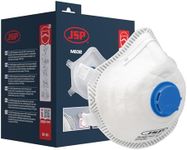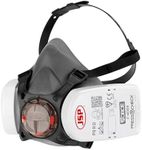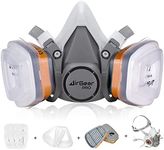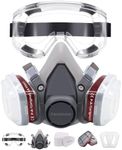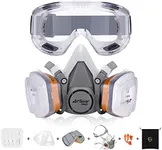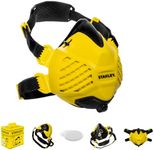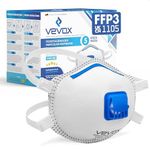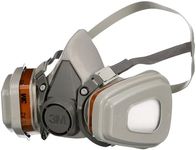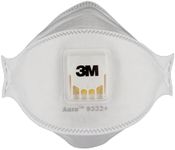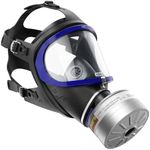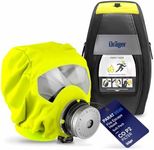Buying Guide for the Best Respirator Masks
Choosing the right respirator mask is crucial for ensuring your safety and health, especially in environments with harmful particles, gases, or vapors. The right mask will depend on the specific hazards you are facing, the duration of exposure, and your comfort. Here are some key specifications to consider when selecting a respirator mask to ensure you get the best fit for your needs.Type of RespiratorRespirator masks come in different types, such as disposable masks, half-face respirators, and full-face respirators. Disposable masks are suitable for short-term use and protection against dust and non-toxic particles. Half-face respirators cover the nose and mouth and can be equipped with replaceable filters for various hazards. Full-face respirators provide the most comprehensive protection, covering the entire face and protecting the eyes as well. Choose the type based on the level of protection you need and the specific hazards you are exposed to.
Filter TypeFilters are a critical component of respirator masks, as they determine what kind of particles or gases the mask can block. Common filter types include N95, P100, and chemical cartridges. N95 filters block at least 95% of airborne particles, making them suitable for dust and non-oil-based particles. P100 filters offer higher protection, blocking 99.97% of particles, including oil-based ones. Chemical cartridges are designed to protect against specific gases and vapors. Select a filter type based on the contaminants present in your environment.
Fit and ComfortA respirator mask must fit snugly to be effective. Masks come in various sizes and designs to accommodate different face shapes. Look for adjustable straps and nose clips to ensure a secure fit. Comfort is also important, especially if you need to wear the mask for extended periods. Consider masks with soft inner linings, lightweight materials, and exhalation valves to reduce heat and moisture buildup. A well-fitting and comfortable mask will be more likely to be worn correctly and consistently.
BreathabilityBreathability refers to how easily you can breathe while wearing the mask. Masks with higher filtration efficiency can sometimes make breathing more difficult. Look for masks that balance protection with breathability, especially if you need to wear the mask for long periods or during physical activity. Masks with exhalation valves can help reduce breathing resistance and improve comfort, but they may not be suitable for environments where sterile conditions are required.
Durability and ReusabilityConsider how often you will need to use the mask and whether a disposable or reusable option is more appropriate. Disposable masks are convenient for short-term use but need to be replaced frequently. Reusable masks, such as half-face and full-face respirators, are more durable and can be used for longer periods with proper maintenance and filter replacement. Evaluate the cost and practicality of each option based on your usage frequency and the specific hazards you face.
Certification and StandardsRespirator masks should meet specific safety standards to ensure they provide adequate protection. Look for masks certified by recognized organizations, such as NIOSH (National Institute for Occupational Safety and Health) in the United States or CE (Conformité Européenne) in Europe. These certifications indicate that the mask has been tested and meets the required safety standards. Always check for certification marks to ensure you are getting a reliable and effective product.
